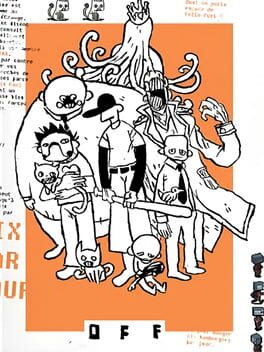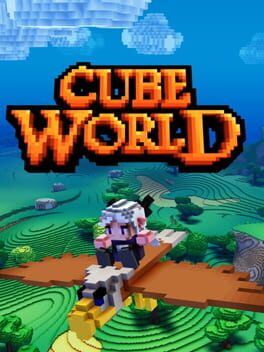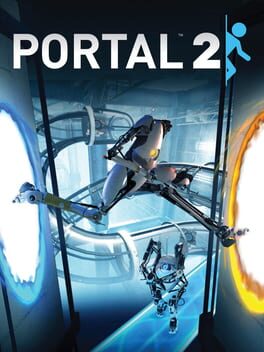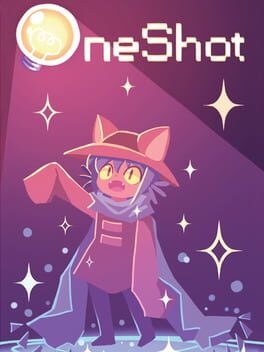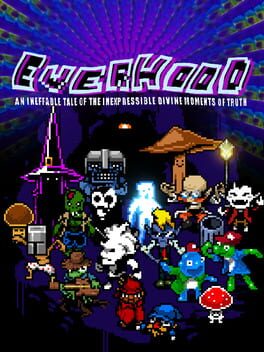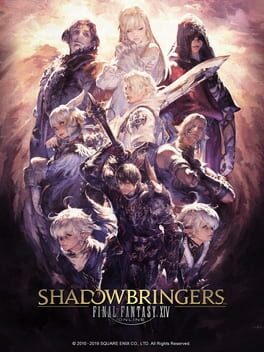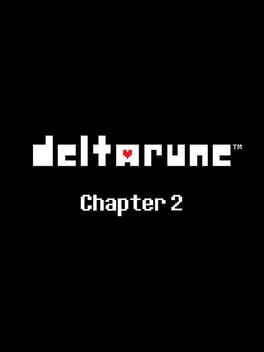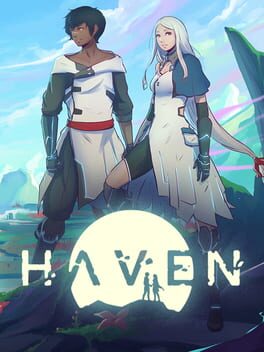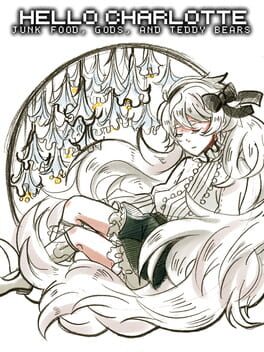Talketsu
BACKER
2008
2020
2018
2008
2019
2019
I think the one thing that I really took away from this game, despite it's impressive seamless world, innovative information-based adventure, and near perfect narrative integration, was it's tonality. Outer Wilds doesn't have the most emotionally charged or life changing story out there, but it's able to make you feel this sense of calm in every moment, from it's most insane to it's most nihilistic.
I do wish the story was a bit more personal in order to really drive home the message and really emphasize the more impactful moments of the games narrative, but I'm content with what I have. The embodiment of sitting alongside the smoldering flame of existence soothed by the tranquility of twilight.
I do wish the story was a bit more personal in order to really drive home the message and really emphasize the more impactful moments of the games narrative, but I'm content with what I have. The embodiment of sitting alongside the smoldering flame of existence soothed by the tranquility of twilight.
2011
2018
When I discovered Youtube as a child I began to traverse the site during the renowned "Countdown" era, where anyone and everyone tried as desperately as they could to tell whatever "Top 10" their brain could muster. It was through these videos that my pure Nintendo heart would discover not only the games of old but also the games out of my reach, like Shadow of the Colossus, Final Fantasy, Devil May Cry, Metal Gear, and most relevantly God of War. The greatest irony I find in playing God of War (2018) now is that a series that I used to find to be nothing but senseless and brash violence, is now something I respect for not only it’s restraint, but also for its subtelty.
The juxtaposition between the epic battles/turbulent lore, and the serenity of the now decrepit Midgard speaks volumes towards the main theme of control. A concept which is not only felt through the dynamics and tones of the narrative but also in the combat, which heavily punishes the player for attempting to act without any sense of thought or strategy. When compounded by the deceptively sizable amount of side content, it all makes for an extremely satisfying and rewarding gameplay experience. Though it isn’t without its flaws, as the game almost feels baked in a lowkey sense of tedium derived from the consistently shallow puzzle mechanics and constantly expanding world which baits my sense of exploration to a fault.
It’s only natural that a game called “God of War” has effective and meaningful gameplay, but what equally impresses me is just how equally natural the narrative flows...most of it at least. The story starts off powerfully and really ignites your journey in so much purpose and intrigue, each event, each storybeat that follows perfectly illustrates and develops the deafening silence of grief and poor communication that Kratos and Atreus share. It is not only a coming of age story for Atreus, but equally one for Kratos (of a different kind of course), and the way the two interact on their own interconnected emotional journeys is graceful and subtle. Yet as the game goes on, the different detours that block your path begin to stop feeling organic and slowly begin to feel more and more artificial, even to the point of ridicule. By the end, the game does grant the player an awesome battle and appropriate conclusion, but they lack the feeling of being truly climactic.
Luckily for me God of War (2018) was written with a sequel in mind, and I’m excited to finally be able to experience this series as it releases unlike when I was a kid. And with how well 2018 setup Ragnarok both lore-wise and thematically, I seriously doubt it won’t be incredible.
The juxtaposition between the epic battles/turbulent lore, and the serenity of the now decrepit Midgard speaks volumes towards the main theme of control. A concept which is not only felt through the dynamics and tones of the narrative but also in the combat, which heavily punishes the player for attempting to act without any sense of thought or strategy. When compounded by the deceptively sizable amount of side content, it all makes for an extremely satisfying and rewarding gameplay experience. Though it isn’t without its flaws, as the game almost feels baked in a lowkey sense of tedium derived from the consistently shallow puzzle mechanics and constantly expanding world which baits my sense of exploration to a fault.
It’s only natural that a game called “God of War” has effective and meaningful gameplay, but what equally impresses me is just how equally natural the narrative flows...most of it at least. The story starts off powerfully and really ignites your journey in so much purpose and intrigue, each event, each storybeat that follows perfectly illustrates and develops the deafening silence of grief and poor communication that Kratos and Atreus share. It is not only a coming of age story for Atreus, but equally one for Kratos (of a different kind of course), and the way the two interact on their own interconnected emotional journeys is graceful and subtle. Yet as the game goes on, the different detours that block your path begin to stop feeling organic and slowly begin to feel more and more artificial, even to the point of ridicule. By the end, the game does grant the player an awesome battle and appropriate conclusion, but they lack the feeling of being truly climactic.
Luckily for me God of War (2018) was written with a sequel in mind, and I’m excited to finally be able to experience this series as it releases unlike when I was a kid. And with how well 2018 setup Ragnarok both lore-wise and thematically, I seriously doubt it won’t be incredible.
2016
One of the most insane, yet purposeful, interesting, and empathetic meta narratives I’ve ever experienced.
Despite the game being a bit sluggish and laborious at times, OneShot is ironically able to cover a wide variety of themes in it’s short run time. Those of which not only serve to create surprisingly impactful emotional/intellectual conflicts in the players brain, but to also deliver an impressive commentary on our humanity and its relationship with fictional narratives.
Although nothing in the game, nothing in fiction may be real, we are capable of giving it life through our emotions and memories. We live through fiction, and fiction lives through us.
Despite the game being a bit sluggish and laborious at times, OneShot is ironically able to cover a wide variety of themes in it’s short run time. Those of which not only serve to create surprisingly impactful emotional/intellectual conflicts in the players brain, but to also deliver an impressive commentary on our humanity and its relationship with fictional narratives.
Although nothing in the game, nothing in fiction may be real, we are capable of giving it life through our emotions and memories. We live through fiction, and fiction lives through us.
2021
At its most fundamental the narrative of Shadowbringers feels alienating, removing us from Eorzea and placing us in a situation that’s seemingly so backwards. A world corrupted by a blinding light so strong it abolished the night, and it’s with this ambiguity of your role as the “Warrior of Light” where Shadowbringers starts to cook all of it’s mastery. Calling into question the unending battle between light and dark that plagues both the series and typical RPG’s, and using the opportunity to instead muse upon the true beating heart of conflict, heroism.
Unlike a work such as AoT which directly criticizes heroism as a shackle which forever catalyzes the endless cycle of violence, Shadowbringers endeavors to celebrate its roots and the righteousness which defines it. By reflecting upon itself through the multi-layered conflict that the lands of Norvrandt contain, we don’t only see the wide and equally personal impact of heroes, but also their necessity. Not only to protect, persevere, and save, but to inspire for our future as the ultimate symbols of both will and humanity at large.
Yet heroism isn’t reserved for just the light, just as Hydaelyn has her champion, so does Zodiark. Each with its own legacy to carry forward, its own right to fight, its own desire for happiness, its own claim to exist. Through this climactic battle of wills and morals is where XIV finds not only it’s strongest emotional beats, but a commentary that will shake anyone cognizant of modern society to their very core.
I’m purely discussing macro here though, because when observing the micro Shadowbringers has a lot of nagging issues consistent with XIV and even of its own design. Yet it’s in the aggregate where you really see the true beauty and elegance of what it was able to accomplish. Ultimately the sin eaters are no different than the Garleans or Dravanias, they are oppressors all the same, but through Norvrandt’s crisis is where XIV is finally able to illuminate its soul, You. The hero who never buckled to your oppressors and continued to keep moving forward, above man and god, towards hell and past it, only to find the answer at the end of the infinite, a glimmer of hope, everlasting.
“Fate can be cruel, but a smile better suits a hero.”
Unlike a work such as AoT which directly criticizes heroism as a shackle which forever catalyzes the endless cycle of violence, Shadowbringers endeavors to celebrate its roots and the righteousness which defines it. By reflecting upon itself through the multi-layered conflict that the lands of Norvrandt contain, we don’t only see the wide and equally personal impact of heroes, but also their necessity. Not only to protect, persevere, and save, but to inspire for our future as the ultimate symbols of both will and humanity at large.
Yet heroism isn’t reserved for just the light, just as Hydaelyn has her champion, so does Zodiark. Each with its own legacy to carry forward, its own right to fight, its own desire for happiness, its own claim to exist. Through this climactic battle of wills and morals is where XIV finds not only it’s strongest emotional beats, but a commentary that will shake anyone cognizant of modern society to their very core.
I’m purely discussing macro here though, because when observing the micro Shadowbringers has a lot of nagging issues consistent with XIV and even of its own design. Yet it’s in the aggregate where you really see the true beauty and elegance of what it was able to accomplish. Ultimately the sin eaters are no different than the Garleans or Dravanias, they are oppressors all the same, but through Norvrandt’s crisis is where XIV is finally able to illuminate its soul, You. The hero who never buckled to your oppressors and continued to keep moving forward, above man and god, towards hell and past it, only to find the answer at the end of the infinite, a glimmer of hope, everlasting.
“Fate can be cruel, but a smile better suits a hero.”
2021
2020
1994
Behind the wackiness of Itoi’s amusing writing is an authenticity which reflects in the eyes of the game's audience, the adolescents. Adolescents who may not fully cognize the world in which they inhabit, their worlds exist simply as impressions of reality, and its Earthbound which exists as physical representation of this impression. Displaying the journey of one such child submerged in a satirical interpretation of western society, maturing through their faceoff with the never ending cycle of corruption we face, and finding the solace that the series’ titular figure endeavors to protect, our Home.
Yet the above paragraph is really only a wish of mine, a wish that Earthbound had really focused on telling that tale, rather than playing up its quirkiness to the extreme. It’s around the halfway mark of the game where its focus begins to fall apart as our slightly humorous adventure through the suburbs and urban streets of Eagland then suddenly shifts to a world round journey of what can only be described as mind numbing insanity. The many gameplay systems of Earthbound such as its combat, leveling, item selection/management, and even menuing simply don’t even hit the base mark necessary for me to casually enjoy the game in any manner. Once you combine that with multiple of what have to be some of the worst designed dungeons I’ve ever played in any RPG, if there were no access to save states or speedup tools my score for this game would’ve had to be one point lower.
Despite partially reclaiming its focus as the game approaches its end through the Magicant section (an area actually acts as a great cohesion point for the narrative) and final boss fight, it isn’t enough to recover from just how mired my experience was for a large portion of it. Regardless, its ambitions didn’t pass me unnoticed, and its legacy is one that I really appreciate as a fan of many of the games which now carry on its many highlights. I look forward to playing Mother 3 in the near future and seeing if Itoi will truly be able to capture me in the way it already has many of you on this site.
Yet the above paragraph is really only a wish of mine, a wish that Earthbound had really focused on telling that tale, rather than playing up its quirkiness to the extreme. It’s around the halfway mark of the game where its focus begins to fall apart as our slightly humorous adventure through the suburbs and urban streets of Eagland then suddenly shifts to a world round journey of what can only be described as mind numbing insanity. The many gameplay systems of Earthbound such as its combat, leveling, item selection/management, and even menuing simply don’t even hit the base mark necessary for me to casually enjoy the game in any manner. Once you combine that with multiple of what have to be some of the worst designed dungeons I’ve ever played in any RPG, if there were no access to save states or speedup tools my score for this game would’ve had to be one point lower.
Despite partially reclaiming its focus as the game approaches its end through the Magicant section (an area actually acts as a great cohesion point for the narrative) and final boss fight, it isn’t enough to recover from just how mired my experience was for a large portion of it. Regardless, its ambitions didn’t pass me unnoticed, and its legacy is one that I really appreciate as a fan of many of the games which now carry on its many highlights. I look forward to playing Mother 3 in the near future and seeing if Itoi will truly be able to capture me in the way it already has many of you on this site.



